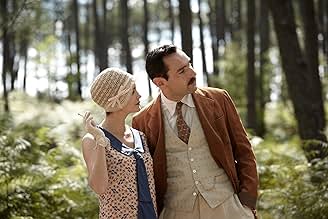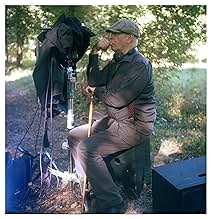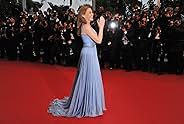Thérèse Desqueyroux
- 2012
- Tous publics
- 1h 50min
NOTE IMDb
6,1/10
4 k
MA NOTE
Ajouter une intrigue dans votre langueAn unhappily married woman struggles to break free from social pressures.An unhappily married woman struggles to break free from social pressures.An unhappily married woman struggles to break free from social pressures.
- Réalisation
- Scénario
- Casting principal
- Récompenses
- 5 nominations au total
Avis à la une
'Thérèse Desqueyroux' is a French drama set in the 1920s in which Audrey Tautou, as the titular Thérèse, is content to play the iconoclast in her stuffy husband's family. But when her best friend (also her sister-in-law) describes her passionate relationship with an attractive young Portuguese man, Thérèse's emotions take a more sinister turn. My one complaint about this is that as Thérèse's husband (played by Gilles Lellouche) is such a central part of the plot it's a shame he is portrayed as such a one-dimensional duffer, ignorant of his wife's feelings in the most stereotypical way, but apart from that this is quite an enjoyable production, both in terms of the plot and the idyllic coastal scenery in which much of the film is set.
There are strong echoes of Madame Bovary and Anna Karenina in Claude Miller's film 'Therese Desqueyroux', derived from a 1920s novel about a woman trapped by convention in a stultifying marriage to a mediocre man. But where Emma Bovary is stupid, Therese is deeply intelligent; whereas Emma has an affair, Therese merely learns of that of her sister in law; and whereas Emma kills herself, Therese tries to murder her husband. In modern parlance, Therese is medically depressed; but while depression may lead to irrational behaviour, it is not itself necessarily without cause. In all these stories, one can feel ambiguous sympathy for the entitled husbands, who may not be likable per se, but who don't fully deserve the hand that fate deals them. There's a nice scene at the end of this film which neatly summarises Monsiuer Desqueyroux's utter emotional constipation. I also liked the way that the time and place (the Landes forest in south west France) are portrayed, and Audtey Tatou is very good in a role which is the opposite of cute.
"Therese" is a lovely looking film. The characters are all attractive, the scenery is pristine and engaging, and the colors really pop out at you. The cinematography is near top-notch.
Ultimately, this is a very dark, and rather depressing story. Although arguably a victim of circumstance, the lead character comes across as rather self-absorbed and pathetic. I'm not sure if that was the intention or not, or even if there was an intention.
The story and dialogue are sufficiently sophisticated to keep the viewer's attention. Overall a solid piece of work with good performances from the cast.
If you liked this review, then please check out my other reviews. I try to review the movies which not many people see.
Ultimately, this is a very dark, and rather depressing story. Although arguably a victim of circumstance, the lead character comes across as rather self-absorbed and pathetic. I'm not sure if that was the intention or not, or even if there was an intention.
The story and dialogue are sufficiently sophisticated to keep the viewer's attention. Overall a solid piece of work with good performances from the cast.
If you liked this review, then please check out my other reviews. I try to review the movies which not many people see.
Who is Therese Desqueyroux? This question remains open after watching the film made in 2012 by Claude Miller, a film bearing the name of the heroine (or simply 'Therese' on the English market and in other countries where the heroine's last name is difficult to pronounce, not to mention write). This is a film that in my opinion did not enjoy the deserved reception, neither from the public nor from the critics. Some of the objections I read are related to the fact that there is no clear explanation of the reasons that push the heroine of the film to extreme deeds and especially there is no moral or moralizing judgment of them. However, actually the character played by Audrey Tautou is consistent with the mystery surrounding the female characters that dominate Claude Miller's films and fits perfectly with the ambiguity of the woman imagined by Francois Mauriac in the novel of the same title, one of the best left behind by this writer who was very popular in the first half of the 20th century, a writer who was awarded the Nobel Prize for literature in 1952. There is also is another aspect that gives value and meaning to 'Therese Desqueyroux'. Much of the story in the film takes place under the sign of death. Claude Miller does not turn the plot, as he could have done, into a horror story, but death or its threat are almost always present. This was Miller's last film. The director was ill with leukemia during its making. I don't know if it should be called a testament film, but it is clear that death was a theme that had become personal and actual for the author.
The story takes place in the late 1920s and early 1930s in the properties of two wealthy families in the French countryside. Young Therese marries Bernard, the brother of her good friend Anne. It is a marriage of convenience, devoid of passion, but through which Therese hopes to ensure to herself the quiet and secure life for the realisation of some vague intellectual ambitions. In a short time, however, she finds herself suffocated by the lack of horizon of the life of a provincial woman, she does not find fulfilment in maternity either, and even Anne's unhappy love story with a Jewish young man, terminated by her family, seems to be a luckier alternative. Can an assassination attempt be the way to liberation? Who can judge her? Justice? The family? Spectators?
The cinematography is exquisite, with several scenes of beautiful and expressive framing that remind some the landscapes of the Impressionists, other the interior paintings of the Flemish masters. The plot is built with attention to detail and psychological delicacy. The lead roles are interpreted by three actors that I like a lot, even if their casting in this film is not ideal. Audrey Tautou is exceptional, in a much darker role than others who have marked her career. (I hope that the rumours about her intentions to give up her acting career will prove to be untrie). Anaïs Demoustier is another very talented actress, but I found her role here less convincing, especially when it comes to erasing the age difference between the two women. Gilles Lellouche has a difficult role as the rude husband, but he creates a character that makes viewers avoid harsh judgments. 'Therese Desqueyroux' is a feminist film in a discreet way, and the moral judgment, if any, is more of a social nature and related to the institution of the family whose stability and appearances becomes the purpose instead of a frame for life. As for understanding Therese's character, I suggest you wait until the closing scene of the film.
The story takes place in the late 1920s and early 1930s in the properties of two wealthy families in the French countryside. Young Therese marries Bernard, the brother of her good friend Anne. It is a marriage of convenience, devoid of passion, but through which Therese hopes to ensure to herself the quiet and secure life for the realisation of some vague intellectual ambitions. In a short time, however, she finds herself suffocated by the lack of horizon of the life of a provincial woman, she does not find fulfilment in maternity either, and even Anne's unhappy love story with a Jewish young man, terminated by her family, seems to be a luckier alternative. Can an assassination attempt be the way to liberation? Who can judge her? Justice? The family? Spectators?
The cinematography is exquisite, with several scenes of beautiful and expressive framing that remind some the landscapes of the Impressionists, other the interior paintings of the Flemish masters. The plot is built with attention to detail and psychological delicacy. The lead roles are interpreted by three actors that I like a lot, even if their casting in this film is not ideal. Audrey Tautou is exceptional, in a much darker role than others who have marked her career. (I hope that the rumours about her intentions to give up her acting career will prove to be untrie). Anaïs Demoustier is another very talented actress, but I found her role here less convincing, especially when it comes to erasing the age difference between the two women. Gilles Lellouche has a difficult role as the rude husband, but he creates a character that makes viewers avoid harsh judgments. 'Therese Desqueyroux' is a feminist film in a discreet way, and the moral judgment, if any, is more of a social nature and related to the institution of the family whose stability and appearances becomes the purpose instead of a frame for life. As for understanding Therese's character, I suggest you wait until the closing scene of the film.
This film is about a blue blooded woman marrying a tycoon, but quickly finds out that marriage is not a thing she likes.
The title "Thérèse Desqueyroux" doesn't give the plot away, but the Hong Kong Chinese title does. As a result, I kept guessing how the plot will turn out. Initially, we see Thérèse having a rather entangled relationship with Anne, which may or may not have played a part in her dissatisfaction in Thérèse's subsequent marriage. Then, the marriage itself is portrayed well, with the husband giving Thérèse much love that is clearly not reciprocated.
However, all these supposed seeds that led to the deed did not adequately explain Thérèse's criminal action. Without a plausible motive, I was left to wonder exactly why she did such a horrible deed. Such a lack of motive may drive suspense and keep viewers on edge, but in "Thérèse Desqueyroux" it only serves to confuse.
In addition, the subplot between Thérèse and Anne, and between Anne and Jean were left hanging, which was quite a pity. The amazing contrasts between the pre-deed, post-deed and liberated Thérèse could not help to lift "Thérèse Desqueyroux" to becoming a great film. I think it is a good film but it is unfortunately masked by hanging subplots and confusion.
The title "Thérèse Desqueyroux" doesn't give the plot away, but the Hong Kong Chinese title does. As a result, I kept guessing how the plot will turn out. Initially, we see Thérèse having a rather entangled relationship with Anne, which may or may not have played a part in her dissatisfaction in Thérèse's subsequent marriage. Then, the marriage itself is portrayed well, with the husband giving Thérèse much love that is clearly not reciprocated.
However, all these supposed seeds that led to the deed did not adequately explain Thérèse's criminal action. Without a plausible motive, I was left to wonder exactly why she did such a horrible deed. Such a lack of motive may drive suspense and keep viewers on edge, but in "Thérèse Desqueyroux" it only serves to confuse.
In addition, the subplot between Thérèse and Anne, and between Anne and Jean were left hanging, which was quite a pity. The amazing contrasts between the pre-deed, post-deed and liberated Thérèse could not help to lift "Thérèse Desqueyroux" to becoming a great film. I think it is a good film but it is unfortunately masked by hanging subplots and confusion.
Le saviez-vous
- AnecdotesMauriac's novel is inspired by the Henriette Canaby attempted murder case (1906).
- ConnexionsReferenced in Not Going Out: Mugging (2014)
- Bandes originalesNo 2 in A Flat (Andantino) [6 moments musicaux, Op. 94 D 780]
Written by Franz Schubert
Performed by Alfred Brendel
Meilleurs choix
Connectez-vous pour évaluer et suivre la liste de favoris afin de recevoir des recommandations personnalisées
- How long is Thérèse?Alimenté par Alexa
Détails
- Date de sortie
- Pays d’origine
- Site officiel
- Langue
- Aussi connu sous le nom de
- Therese Desqueyroux
- Lieux de tournage
- Bonzac, Gironde, France(Desqueyroux castle)
- Sociétés de production
- Voir plus de crédits d'entreprise sur IMDbPro
Box-office
- Budget
- 12 700 000 $US (estimé)
- Montant brut aux États-Unis et au Canada
- 101 944 $US
- Week-end de sortie aux États-Unis et au Canada
- 20 050 $US
- 25 août 2013
- Montant brut mondial
- 4 408 087 $US
- Durée1 heure 50 minutes
- Couleur
- Mixage
- Rapport de forme
- 2.35 : 1
Contribuer à cette page
Suggérer une modification ou ajouter du contenu manquant

Lacune principale
By what name was Thérèse Desqueyroux (2012) officially released in India in English?
Répondre


























